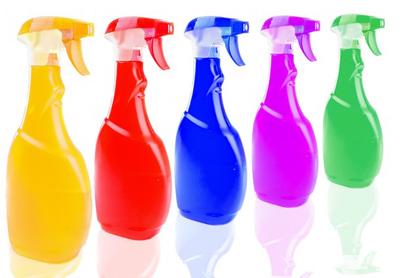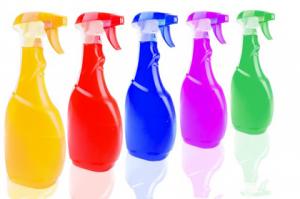Litter tray hygiene is vital for all cats, especially kittens. Find out how to keep your litter trays clean and your cats healthy.

Since litter tray hygiene is so important, especially for kittens, choosing the right litter tray cleaning product is vital. Here, we will list several options, along with their benefits and drawbacks. It is important to keep litter trays clean and hygienic, but it is vitally important in a multi-cat or breeding household to make sure that litter trays are cleaned with something that will kill viruses and bacteria at the very least. Read on to find out what litter tray cleaning product best suits your cats needs.

Litter tray cleaning options:
Bleach
-
Bleach is an excellent cleaning product. It kills viruses and bacteria, but not all parasitic cysts.
-
It is essential to dilute the bleach. Suggested ratios are 1 part bleach to 32 parts water, except for ringworm where 1 part bleach to 10 parts water is recommended.
-
For bleach to be effective, the environment must be free from all biological material. Therefore, when cleaning a litter tray, before you add the bleach, you must ensure that the tray is completely clean.
-
Bleach has been linked to Chronic Obstructive Pulmonary Disorders in humans, so if you are going to use bleach anywhere in your home, make sure the area is well ventilated and never use it with hot water as this will increase the amount of bleach you breathe in. Only ever use it with completely cold water.
Anti-viral cleaners
-
This includes things like Anigene and Parvo-virucide
-
They kill viruses, fungi and bacteria quickly and effectively
-
There has been little research done on their impact on human health in the same way that bleach has been studied - so always make sure the area is well ventilated before using them and never mix them with hot water
-
Parvovirucide is effective even in the presence of other biological material, so if you miss a bit of litter in the tray, then unlike with bleach, these will still be effective. Find parvovirucide here.
Litter tray cleaning options: natural remedies
-
Rubbing alcohol is very effective at killing viruses, but there has been little research done in relation to cats specifically
-
Tea tree oil is an effective anti-fungal, but is thought to be toxic to cats so we would not recommend its use
-
Household cleaners like vinegar may be effective in removing dirt and grime, but are not sufficient to kill viruses and nasty bacteria
Accelerated Hydrogen Peroxide
-
This is the only substance that has been shown to effectively kill Cryptosporidium cysts within a reasonable time frame. If you know for a fact that you have Cryptosporidum infection, this is the best way to kill the cysts. Your vet will be able to run diagnostic tests that will confirm a Crypto infection. A thorough, methodical cleaning routine will be needed to eradicate it, along with medication for all of the cats in your home. Accelerated hydrogen peroxide is the only litter tray cleaning product that will meet your needs.
-
It is a highly effective cleaner that neutralises nasties within a maximum of around 10 minutes
-
it is safe for use around cats, but we also recommend removing any cats from an area where cleaning products are being used. They can be safely returned to the area once everything is dry.
Steam cleaners
- In order to be effective a steam cleaner must bring the temperature of the surface you are cleaning high enough to kill bacteria and viruses. Estimations for this vary between 60C and 120C
- in our experience, even very good steam cleaners do not manage to do this. Those that do require the steamer to be held on the surface for several minutes in one place, which is not practical.
- Steam cleaners also put huge amounts of moisture into the environment, which can cause issues with mold/fungus, bacteria and certain parasites
- We therefore do not recommend steam as a disinfectant cleaning method. It can be effective as an aesthetic cleaning method.
Johnson’s Clean ‘n Safe
-
This is specifically marketed as a litter tray cleaning product. You can find it in most pet stores.
-
It works out at a very expensive solution, compared to the options listed above
-
We were surprised when reading the ingredients list to find at least one ingredient that is thought to be toxic to cats: Benzalkonium Chloride. We would therefore not use this product.
Dettol and other phenols
-
Phenols, contained in Dettol, are highly toxic to cats. We recommend that they are never used, but if you do use it make sure that everything is completely rinsed so there is no residue from the dettol at all, before your cat has access to the area
-
Dettol now do a product in an aerosol spray which states that it can be used on pet bedding. We do find this an excellent product for fabric items like sofas, but use it only sparingly when there are no cats around and ensure it is dry before the cats are allowed near it.
Litter tray cleaning options we recommend for cats and litter trays
If you have Cryptosporidium in your home or cattery, you must use Accelerated Hydrogen Peroxide to clean on a daily basis, and preferably as often as possible until you are completely clear of the infection. We would suggest continuing to clean with Accelerated Hydrogen Peroxide for at least 6-12 months after the infection has been cleared.
In a one or two cat household remember that, whilst hygiene is very important, cleaning products are generally not very good for us or for our feline friends. An approach in a usual home is therefore a balancing act between maintaining good cleanliness and not overloading the home with harsh chemicals. Provided that litter trays are emptied and cleaned regularly, a simple washing up liquid solution could suffice supplemented by using a bleach solution or anti-viral once every week or two.
If however, you have more than one or two cats, your cats go outdoors, or one of your cats is showing any signs of illness, it is time to get serious about litter tray hygiene. In those circumstances, assuming Cryptosporidium is not an issue, we recommend a good anti-viral cleaner to be used daily on litter trays and the surrounding areas. In cases of illness and diarrhea specifically, we would recommend that you use it twice daily until the infection is cleared. We would also suggest you use it on any fabric items, as viruses can live for up to 8 weeks on fabric. Washing machines only kill viruses on a 60C wash. For non delicate items like pet beds, an anti-viral solution in a fine spray bottle can be used to mist them. For more delicate items we would suggest using a Dettol aerosol, but use it with caution and only where absolutely necessary.
Litter tray replacement
Remember that litter trays get scratched very easily by cat claws. Scratches in plastic provide excellent homes for bacteria and viruses to live in. It is also harder for cleaning products to access bacteria and viruses living in these scratches. We therefore recommend replacing litter trays at least once a year to minimise this risk. A good anti-viral cleaner like Parvovirucide should be able to penetrate the scratches, but a washing up liquid solution would reality struggle to loosen viruses from such a stronghold. Normal soaps, like washing up liquid, work by simply lubricating the viruses and bacteria so that they can then be rinsed away with water.
Tips for using cleaning products around cats
- always check the ingredients on the label of a cleaning product before using it around your cats. Many cleaners contain substances that are toxic to cats
- even when using a safe product, read the instructions thoroughly and follow them
- always ensure that cats are removed from the area until the product has thoroughly dried
- always keep the area well ventilated to protect your own health
We use a good anti-viral cleaning solution daily on our litter trays, as this suits our needs best: we are a multi cat household so we like to take all reasonable precautions to ensure our cats stay as healthy as possible.
Read more
- You can read more about cat and kitten litter tray hygiene in a multi-cat and breeding household, as well as in a pet home, in our article Litter Tray Hygiene.
- Learn about toxoplasmosis and cats
- If you are looking for a kitten, read about how to choose your kitten breeder.
- If you would like to know more about our approach to raising our British Shorthair kittens and our cleaning regime, discover the life of a Bombadillo kitten and then read about our philosophy.